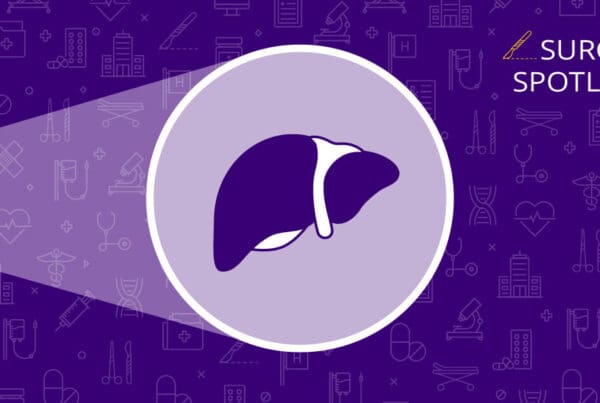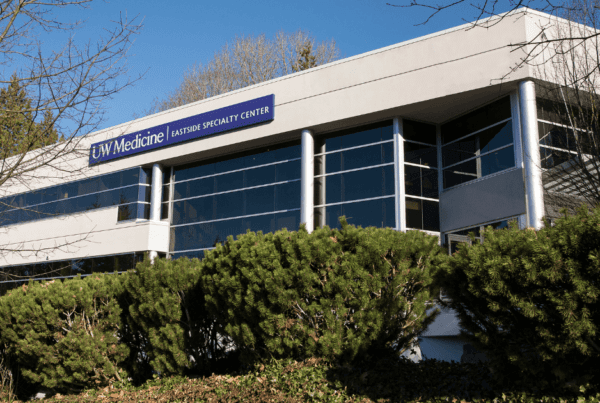Highlights | Reducing the risk of disease progression
- Monoclonal antibodies are laboratory-made proteins that imitate the immune system’s ability to fight off viruses like SARS-CoV-2.
- They attack the virus and reduce its ability to spread through your body.
- Clinical trial data suggests that treatments greatly reduce hospitalizations for high-risk patients.
- Currently available monoclonal antibody treatment options are resource intensive and not always widely available.
- UW Medicine researchers are looking at ways to make COVID-19 treatment more accessible.
Monoclonal antibody treatments are one of the more promising treatments for patients with a confirmed case of COVID-19. In November 2020, the U.S. Food and Drug Administration (FDA) issued an emergency use authorization (EUA) of monoclonal antibody therapy for the treatment of COVID-19.
UW Medicine has offered this therapy at Valley Medical Center since the spring of 2021 and recently expanded the service to UW Medical Center – Montlake, UW Medical Center – Northwest and Harborview Medical Center.
Though effective in preventing severe COVID-19 disease, this therapy is resource intensive and not always widely available, so researchers are working on ways to make COVID-19 treatment more accessible.
What are monoclonal antibodies and how does the treatment work?
“They are pharmaceutically made antibodies used to treat infections, and in this situation, COVID-19,” says Shireesha Dhanireddy, MD, medical director of the Infectious Diseases Clinic at Harborview. “Monoclonal antibodies are infused and directly act on the virus to decrease progression of symptoms.”
The monoclonal antibodies are designed to block the virus’ attachment and entry into human cells, aka, the spike protein of SARS-CoV-2, and reduce the virus’ ability to spread through the body.
Dhanireddy says that if a patient hasn’t had the opportunity to develop an immune response from receiving one of the COVID-19 vaccines — that’s where these laboratory-made antibody proteins can be useful.
Who is eligible for this treatment?
Recently, the FDA expanded its guidelines to include post-exposure prevention for COVID-19 in adults and pediatric patients (12 years of age and older weighing at least 40 kilograms, which is about 88 pounds) who are considered high risk, as well as for high-risk patients that have received a recent positive COVID-19 test.
Note, this treatment is not to prevent COVID-19 before being exposed to the SARS-CoV-2 virus, only after exposure to the virus. Think of it as an aide for the immune system upon exposure or infection, for high-risk patients that is.
“High risk could be anyone over 65 or immunosuppressed regardless of vaccination status, or anyone unvaccinated with risk factors for severe disease, such as heart disease, lung disease or obesity,” says Dhanireddy.
In short, this treatment has the potential to help our large population of high-risk patients avoid hospitalization.
How does it work?
The earlier you can get this therapy, the better, says Dhanireddy. She recommends patients receive this treatment within 7 days of symptom onset — the earlier, the better.
The in-hospital infusion or injection procedure takes about two hours from start to finish since the drug has to be mixed and the patient has to be monitored, says Dhanireddy. The actual infusion process takes about 20 minutes.
Dhanireddy notes that the monoclonal antibody treatment is generally well tolerated, but since the intravenous infusion or injection is done in the hospital, staff are prepared if a patient does exhibit allergy symptoms.
“There is potential for inflammatory reactions during or immediately after infusions,” says Dhanireddy. “We do monitor vital signs including blood pressure during and after infusion and have medications on hand like inhalers or antihistamines.”
How effective is it?
The FDA reports that a single intravenous infusion significantly reduced COVID-19-related hospitalization and death during a 29-day follow-up period as compared to the placebo in a clinical trial. The most recent update noted an 85% reduction in death or hospitalization when given the treatment compared to the placebo. Plus there are even more promising studies to back up that data.
Based on the current data and recommendations, Dhanireddy says that if you have been vaccinated and have a normal immune system and mild symptoms, this treatment likely isn’t necessary if you receive a positive COVID-19 test result or have had exposure. For people who are immunosuppressed or older (i.e., over 65), she recommends considering this treatment to prevent progression to serious disease.
Can monoclonal antibody treatment be used as a vaccine substitute?
“Monoclonal antibody treatment is not a substitute for the vaccine,” says Dhanireddy. “Vaccines are highly effective at preventing disease and are still our best way of not transmitting infection to others.”
She also notes that receiving a vaccination or having a previous case of COVID-19 does not preclude the use of this medication depending on your underlying risk factors for severe disease.
How much does the treatment cost?
The medication is free of charge to patients, but there is an infusion charge for the outpatient procedure. The cost to the patient will depend on their insurance and coverage.
What research is being conducted at UW Medicine?
Harborview is part of the Rise Above COVID ACTIV-2 study, which is testing different medicines from different companies with varying forms of administration (oral pills, shot, infusion or inhaler) to see if they are safe and can help prevent adults from progressing from mild COVID-19 to severe COVID-19 or hospitalization.
Call 206.773.7129 to consider enrolling in the ACTIV2 study if you have tested positive for SARS-CoV-2 (COVID-19) within the last seven days.
Why is studying more accessible treatments important?
Although monoclonal antibody treatment can help prevent severe illness or provide a quicker recovery, it isn’t as widely available or distributed as the news often makes it out to be.
“One of the main things we’re studying are less intense ways of administering antibodies, like a shot instead of an infusion,” says Rachel Bender Ignacio, MD, MPH, assistant professor of Allergy and Infectious Diseases and director of both Fred Hutch’s COVID-19 Clinical Research Center and Harborview’s ACTU research unit. “Potentially, these less intense drugs could be given in a drive-thru clinic rather than in an overburdened ER.”
Right now, the issue with current intravenous monoclonal antibody treatments is accessibility due to limited hospital resources and staffing. It’s why this research for more accessible and equitable forms of COVID-19 treatment is important.
Essentially, these treatments are taking someone who doesn’t have an immune response to COVID-19 or the vaccine and bathing them in synthetic antibodies very quickly, she explains.
Infusions put antibodies right into the blood stream and reach peak levels within 30 minutes of the transfusion, but that process can take from 15 minutes to an hour. It’s time-consuming for both hospital staff and patients.
On the other hand, intramuscular administration is easily administered but it takes time for the antibodies to diffuse through the muscle, often up to two to three days.
The best option would be an oral antiviral medication (not a monoclonal antibody drug) that a primary care provider could prescribe at the early signs of infection, says Bender Ignacio.
“There is tension between the provision of monoclonal antibodies, which we know work, and continuing to study new agents — it’s an ethical conundrum,” says Bender Ignacio. “We dually need more access, but also more research into other treatments like antiviral medications.”
Why do we still need public health precautions if we have a treatment for COVID-19?
“Vaccination is prevention, and treatment is what we should be doing if that doesn’t work,” says Bender Ignacio. “Monoclonal antibody treatment is meant to prevent severe illness for those who have been exposed and don’t have any other available treatment options.”
In other words, monoclonal antibodies are great, but the best way to prevent getting severely ill from COVID-19 is following public health guidelines and getting vaccinated.
Photo Caption: Shutterstock


